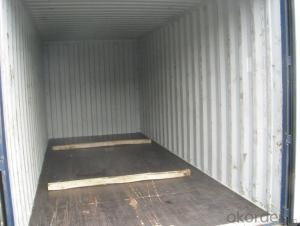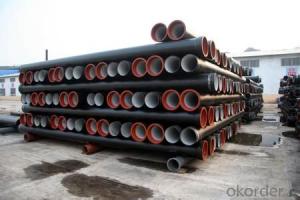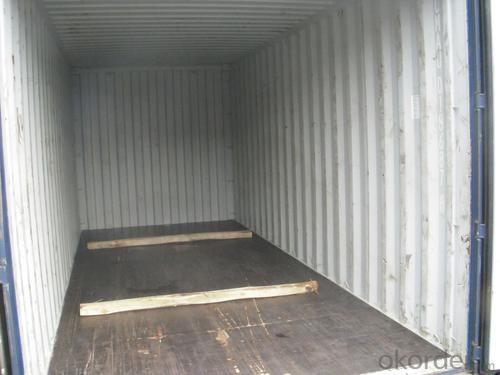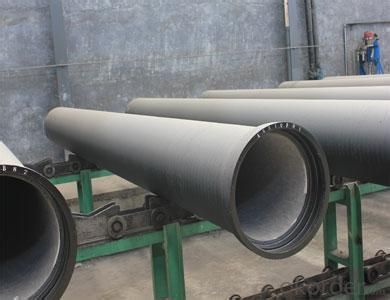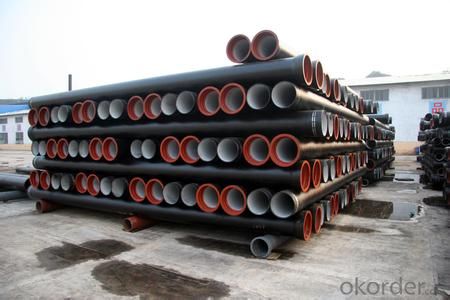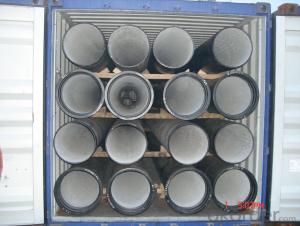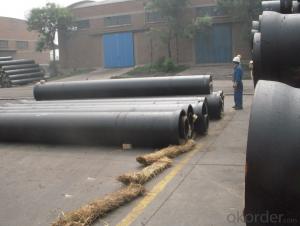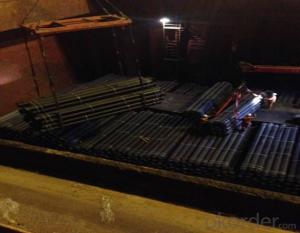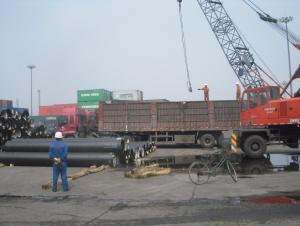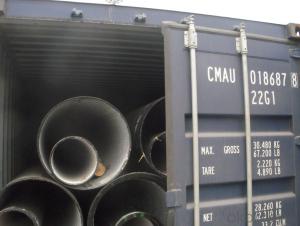DUCTILE IRON PIPES K8 DN1400
- Loading Port:
- China Main Port
- Payment Terms:
- TT OR LC
- Min Order Qty:
- -
- Supply Capability:
- -
OKorder Service Pledge
OKorder Financial Service
You Might Also Like
Ductile Iron Cast Pipe is without any defects compare with tradition casting tech, which has many advantages particularly as follow:
(1) High density. In the "vertical upward casting" process, the melt iron of centre liquid column in center crystallizer is continuously feeding for volume shrinkage caused by condensation tube at outer circumference , which lead to be free of shrinkage porosity.
(2) High purity. When melt iron pouring, the mixed impurities such as gas, dross, sand grain which are lighter than melt iron could be eliminated at furnace mouth, its impossible to enter into the crystallizer through the channel, so the melt iron into the crystallizer is very pure.
(3) Strength with toughness. The cooling speed provided by continuous crystallizer is 30 times than sand casting and 5 times than centrifugal casting, and doesn't produce white iron, the eutectic cell volume of continuous cast iron is one eighth to one tenth compare with traditional cast iron. The density of graphite nodule in ductile iron can reach 300-700 pcs/mm2. Therefore, all reason above improve the strength and toughness of continuous cast iron.
(4) Free machining. The high speed cooling make the hardening phase (such as boride, steadite) not appear like reticular, massive or thick, but diffuse like fish bone and pane in shape, moreover, there are tiny graphite flakes inlaid hardening phase. It's free machining in BrinellHardness the range of 250-300HB. However, the Brinell Hardness of 250 is top limit to common metal materials.
(5) Uniform composition of tube wall. The convection mixing of liquid column caused by marching type drawing in crystallizer make the composition of tube wall well-distributed, and concentration gradient very little.
(6) High productivity. To the wall thickness of tube under 10mm, the speed of continuous casting is 1 meter/min, to the wall thickness of tube under 20mm, the speed of continuous casting is 0.5 meter/min, which is high efficiency that centrifugal or other casting tech couldn't reach.
- Q: What is the maximum pressure rating for ductile iron pipe?
- The maximum pressure rating for ductile iron pipe typically depends on several factors such as the pipe diameter, wall thickness, and the type of joint used. Generally, ductile iron pipe is manufactured to withstand a maximum pressure rating of up to 350 psi (pounds per square inch) or higher. However, it is important to consult the specific manufacturer's specifications and guidelines to determine the exact maximum pressure rating for a particular ductile iron pipe.
- Q: Can ductile iron pipes be used for offshore oil and gas installations?
- Yes, ductile iron pipes can be used for offshore oil and gas installations. Ductile iron is known for its strength, durability, and corrosion resistance, making it suitable for various applications including offshore environments. Additionally, ductile iron pipes are cost-effective and can withstand high pressure and extreme weather conditions, making them a reliable choice for offshore oil and gas installations.
- Q: What are the typical joint restraint requirements for ductile iron pipes?
- The typical joint restraint requirements for ductile iron pipes involve the use of mechanical joint restraints, such as thrust blocks or tie rods, to prevent the pipe from separating or moving under internal pressure or external forces. These restraints ensure the stability and integrity of the pipeline system.
- Q: Can ductile iron pipes be made into clear tubes?
- Of course, the cast iron pipe is suitable for being buried in the ground because of its corrosion resistance, rust resistance and non deformation.
- Q: Can ductile iron pipes be used in areas with high soil settlement?
- Ductile iron pipes are suitable for areas with high soil settlement due to their strength and durability. They can withstand external loads and ground movement, making them an ideal choice for such areas. Additionally, these pipes have a high resistance to corrosion, making them even more suitable for use in areas with high soil settlement. However, it is important to consider factors such as proper installation techniques, appropriate bedding and backfill materials, and regular maintenance to ensure the longevity and performance of the ductile iron pipes in these areas. Consulting with a qualified engineer or pipe manufacturer can provide more specific guidance based on the site's conditions and requirements.
- Q: Can ductile iron pipes be used in areas with high groundwater levels?
- Yes, ductile iron pipes can be used in areas with high groundwater levels. Ductile iron pipes are known for their strength, durability, and resistance to corrosion, making them suitable for various applications, including water supply systems. They can withstand high groundwater levels without compromising their structural integrity. Additionally, ductile iron pipes have a smooth interior surface, which helps in maintaining the flow capacity and reducing the risk of clogging or sediment buildup. Therefore, they are a reliable choice for areas with high groundwater levels, providing a long-lasting and efficient solution for water distribution systems.
- Q: Are ductile iron pipes suitable for acidic or alkaline environments?
- Ductile iron pipes are generally suitable for both acidic and alkaline environments, although their performance may vary depending on the specific conditions. Ductile iron is a type of cast iron that has been treated with a small amount of magnesium to enhance its strength and flexibility. This treatment allows ductile iron pipes to withstand a wide range of conditions, including those found in acidic or alkaline environments. In acidic environments, ductile iron pipes provide good resistance to corrosion. The iron in the pipes reacts with the acid to form a protective layer of iron oxide, which helps prevent further corrosion. However, it is important to note that the performance of ductile iron pipes in acidic environments can be influenced by factors such as the concentration of the acid and the temperature. In highly concentrated or extremely acidic conditions, alternative materials like stainless steel or corrosion-resistant alloys may be more suitable. Similarly, in alkaline environments, ductile iron pipes exhibit good resistance to corrosion. The alkaline conditions in these environments typically help to passivate the surface of the iron, forming a protective layer that prevents further corrosion. However, as in acidic environments, the specific conditions and concentrations of alkalis may impact the performance of ductile iron pipes. In cases of very high alkalinity or extreme temperatures, other materials like plastic or concrete pipes may be more appropriate. It is worth noting that although ductile iron pipes are generally suitable for both acidic and alkaline environments, regular maintenance and monitoring are crucial to ensure their long-term performance. Proper attention should be given to monitoring the pH levels and other chemical characteristics of the environment to identify any potential issues or required maintenance. Consulting with experts or engineers in the field can provide valuable insights and guidance in selecting the most appropriate materials for specific acidic or alkaline environments.
- Q: Are ductile iron pipes suitable for use in sewage pumping stations?
- Ductile iron pipes are highly suitable for use in sewage pumping stations due to their advantageous properties. These pipes are renowned for their durability, strength, and excellent corrosion resistance, making them an ideal choice for wastewater applications. They can endure the high pressures and abrasive characteristics of sewage systems without experiencing significant degradation or loss of performance over time. Moreover, the smooth interior surface of ductile iron pipes minimizes friction losses and prevents blockages. Additionally, these pipes have a long lifespan and require minimal maintenance, resulting in reduced overall operating costs. In conclusion, ductile iron pipes are an excellent option for sewage pumping stations.
- Q: What kind of joints are used with ductile iron pipe?
- Ductile iron pipe typically uses mechanical joints or push-on joints. Mechanical joints consist of a gland and a rubber gasket that are used to connect two pipes together. These joints are secured by bolts or other mechanical means to ensure a tight and secure connection. Push-on joints, on the other hand, do not require any bolts or additional hardware. They simply involve the insertion of a rubber gasket into the socket of the pipe, which creates a sealed connection. Both types of joints are widely used with ductile iron pipe and offer reliable and leak-free connections for various applications.
- Q: Can ductile iron pipes be used for stormwater drainage systems?
- Yes, ductile iron pipes can be used for stormwater drainage systems. Ductile iron pipes are known for their strength, durability, and corrosion resistance, making them suitable for various applications, including stormwater drainage. They can handle high volumes of water flow and withstand heavy traffic loads, making them a reliable choice for stormwater management. Additionally, ductile iron pipes have excellent joint performance, ensuring a watertight and secure connection, which is crucial for preventing leaks and maintaining the integrity of the stormwater drainage system. Overall, ductile iron pipes are a viable option for stormwater drainage systems due to their robustness, longevity, and ability to withstand the harsh conditions often associated with stormwater management.
Send your message to us
DUCTILE IRON PIPES K8 DN1400
- Loading Port:
- China Main Port
- Payment Terms:
- TT OR LC
- Min Order Qty:
- -
- Supply Capability:
- -
OKorder Service Pledge
OKorder Financial Service
Similar products
Hot products
Hot Searches
Related keywords
